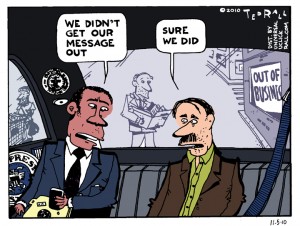Wanna buy a discounted copy of “The Year of Loving Dangerously”? This $18.95 hardback can be yours for a mere $10 (plus $3 media mail shipping). The only thing wrong with it is that it’s inscribed to “Adrian.”
The book originally went out by mail, but it never turned up. So I sent out a replacement copy. Eventually–a year later–the original copy came back. So that’s the scoop.
Anyway, email me at chet (at) rall (dot) com if you want it. Payment via PayPal only for this item.
Also don’t forget that I’m still selling signed copies of the Anti-American Manifesto.

